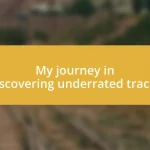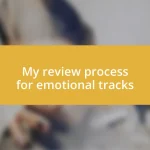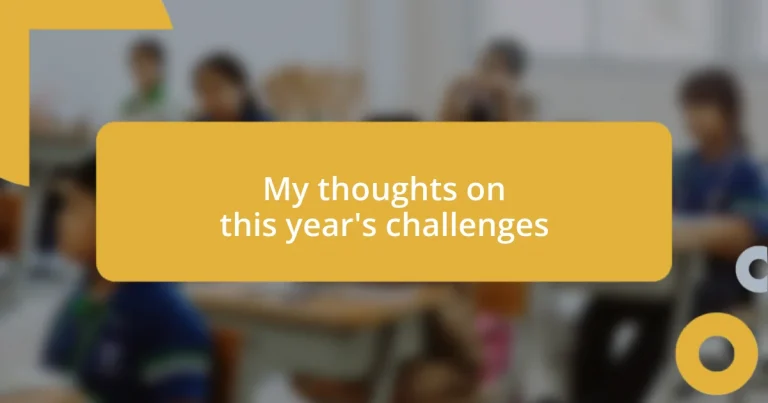Key takeaways:
- Adaptability is essential; being flexible can lead to unexpected opportunities and personal growth.
- Community support and meaningful connections help combat feelings of isolation and foster resilience.
- Sharing insights and practicing active listening deepens relationships and enhances understanding of diverse perspectives.
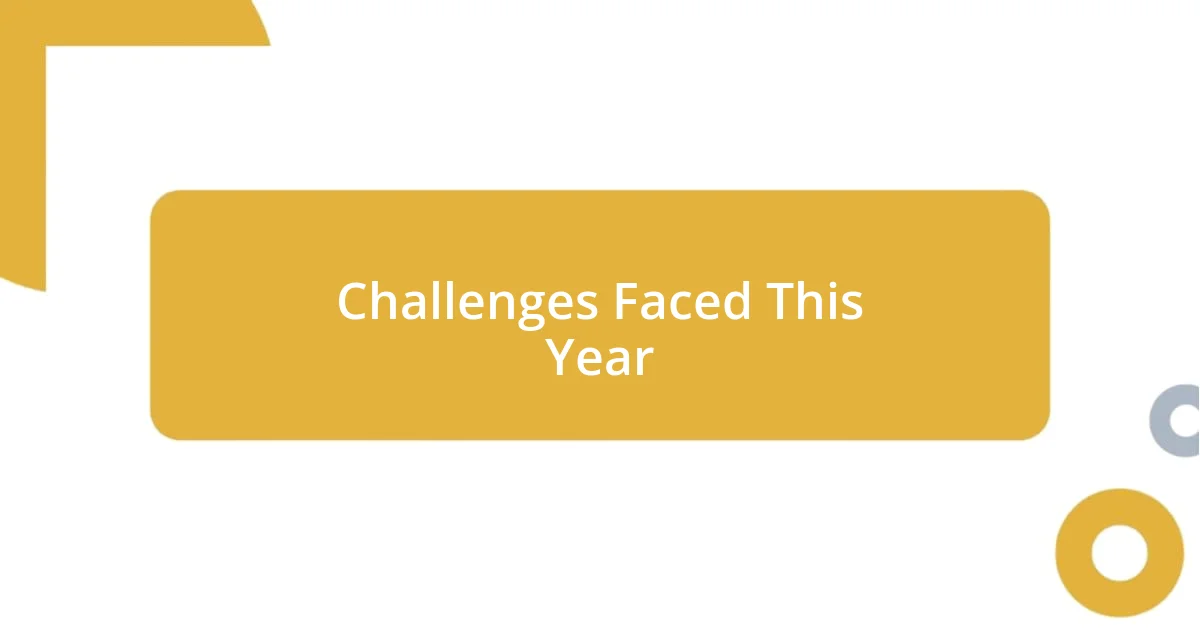
Challenges Faced This Year
This year brought an overwhelming wave of uncertainty, particularly in the realm of mental health. I noticed how the constant changes in information—like shifting regulations and emerging variants—left many of us feeling anxious and exhausted. Have you ever sat quietly, reflecting on how the news cycles seem relentless? It’s tough not to feel like we’re caught in a spin cycle of worry and confusion.
In my experience, work-life balance has been harder to maintain than ever. I found myself working longer hours, often losing track of time while staring at a screen. Do you remember those days when it felt like life bled into work so seamlessly it was hard to differentiate between the two? I’ve learned the importance of setting boundaries, even if it felt uncomfortable at first.
One specific challenge I faced was dealing with isolation. Despite being digitally connected, I often felt a pang of loneliness that caught me off guard. Have you ever felt surrounded by people yet completely alone? I realized that virtual interactions, while beneficial, could never replace the warmth of an in-person conversation or a simple hug from a friend. Balancing these feelings has been a significant emotional journey this year.
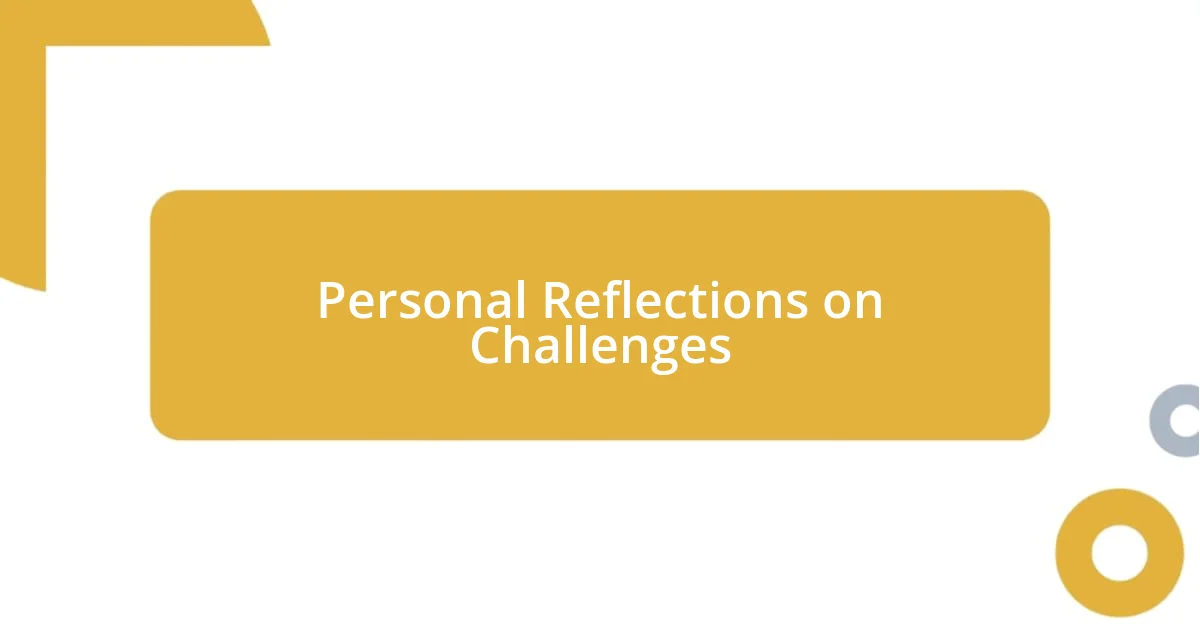
Personal Reflections on Challenges
This year, I’ve found myself grappling with a sense of impatience, especially when it comes to achieving my goals. There were moments when I felt like I was running a marathon with no finish line in sight—exhausting, right? I had to remind myself that progress isn’t always linear. Sometimes, taking a step back can lead to a more thoughtful approach. Have you ever had that moment where you realized slowing down actually helps you move forward?
I also faced the challenge of re-evaluating my support network. I’ve always relied on friends for strength, but this year, the pandemic made me question whether those connections were as robust as I thought. During a particularly tough week, I reached out to an old friend I hadn’t spoken to in years. It brought back a flood of memories and helped me feel grounded again. Isn’t it incredible how revisiting the past can help us find clarity in the present?
Looking back, the challenge of adapting to new forms of communication also stood out for me. I’ve always been one for face-to-face interactions, and transitioning to video calls felt unnatural at first. I remember one virtual meeting where I misinterpreted so many nuances—there’s something about reading a room that just doesn’t translate through the screen. My perspective shifted as I learned to see these digital connections as valuable in their own right, but they still sometimes leave me wishing for the spontaneity of in-person chats.
| Challenge | Personal Anecdote |
|---|---|
| Impatience | Realizing that progress isn’t always linear helped me regain focus. |
| Support Network | Reconnecting with an old friend brought back clarity during a tough week. |
| New Communication Forms | Transitioning to video calls taught me to value digital connections while missing in-person nuances. |
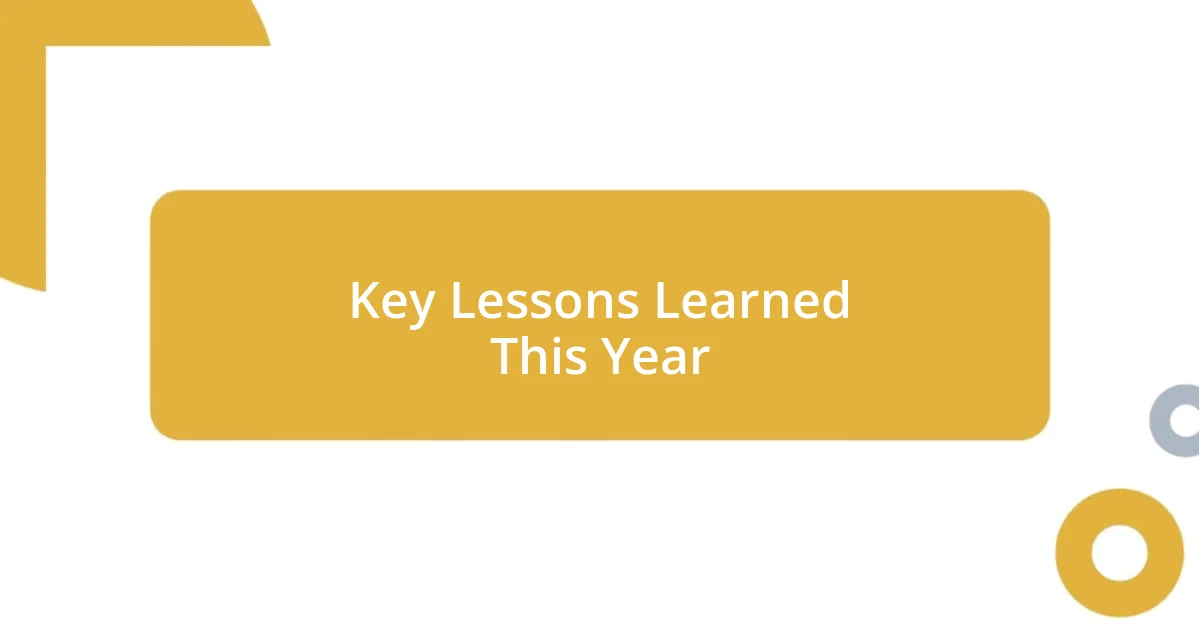
Key Lessons Learned This Year
Reflecting on this year’s challenges, I’ve learned that adaptability is more crucial than ever. It’s fascinating how quickly things changed around us; I found myself having to pivot frequently. I vividly remember a project I was passionate about that got derailed due to shifting priorities. Instead of letting frustration take over, I embraced the need for flexibility. It turned out that this shift opened doors I hadn’t considered before.
Here are some key lessons I’ve taken away from this year:
- Adaptability is vital; being able to pivot can lead to unexpected opportunities.
- Mental health should not be overlooked; I carved out time for self-care, even on the busiest days.
- Community support is essential; I made an effort to check in on friends more regularly, fostering deeper connections.
- Setting boundaries became a practice; I began creating a “no work” zone at home to reclaim my personal space.
- Gratitude shifted my perspective; I started journaling daily, focusing on small moments of joy, which made a big difference in my mindset.
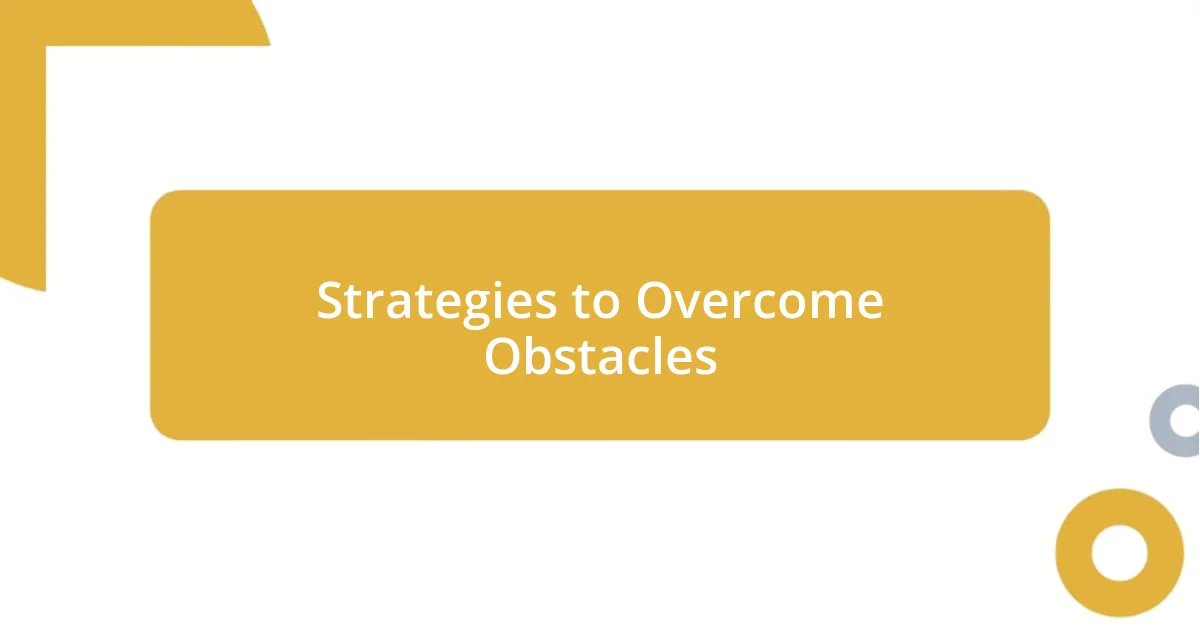
Strategies to Overcome Obstacles
When faced with obstacles, I’ve found that breaking tasks down into manageable chunks can do wonders. For instance, I once had a daunting project that felt overwhelming at first. By dividing it into smaller tasks and tackling one at a time, I discovered how much progress I was making without the stress hanging over me. Have you ever tried this approach? It can be incredibly satisfying to check items off a list.
Another strategy that has proven effective for me is seeking feedback from others. I used to shy away from sharing my work until it felt “perfect.” But when I did seek input from my peers, I not only improved my work but also found genuine support and new perspectives. It’s funny how collaboration can turn what feels isolating into a shared journey. Have you experienced the same?
Lastly, I’ve realized that cultivating a positive mindset is crucial in overcoming challenges. Whenever negative thoughts crept in, I made it a point to challenge those beliefs. By reflecting on past successes and the resilience I demonstrated, I found a sense of empowerment. Remember that time you overcame something tough? Recalling those moments can ignite your motivation to push through obstacles. It’s about fostering that inner dialogue that reminds you of your strength.
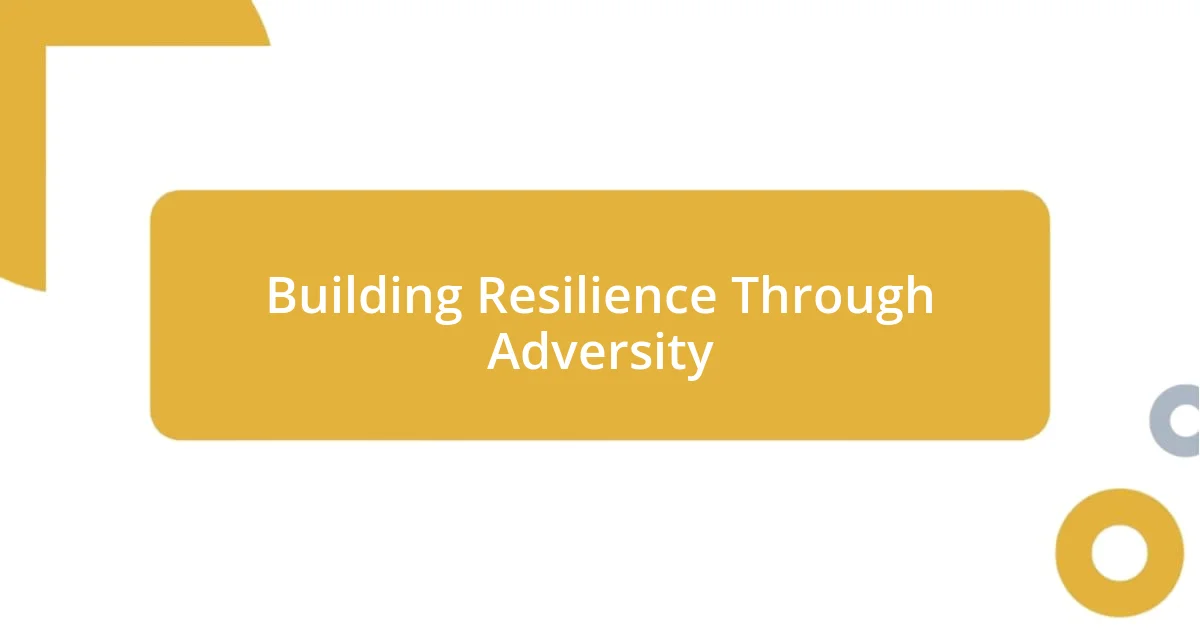
Building Resilience Through Adversity
Building resilience is often born from the struggles we face. I think back to a particularly challenging period when I lost a significant client at work. It felt like the rug had been pulled out from under me, and the initial shock was hard to shake off. But instead of staying in that defeated mindset, I pushed through, using that experience as a stepping stone. Have you ever felt like adversity was a dead end, only to realize it opened up new paths? It’s in those moments we discover our strength.
Emotional challenges can also serve as a powerful teacher. There were times when I felt overwhelmed by doubt, especially during critical decisions. I remember sitting quietly, reflecting on my past experiences and how they had shaped me. I asked myself, “What did I learn from those tough times?” This introspection allowed me to recognize that every setback was a lesson in disguise, nurturing my resilience. How do you navigate your thoughts during tough moments? I found that acknowledging my emotions helped me move forward with greater clarity.
I’ve come to appreciate the role of community in building resilience. Last year, I joined a support group where we shared our struggles and celebrated our victories, no matter how small. Listening to others reinforced my belief that we’re never truly alone in our battles. It’s comforting to know that sharing vulnerabilities can turn struggles into strengths. Have you ever sought solace in a community? For me, it became a source of inspiration, fueling my ability to bounce back.
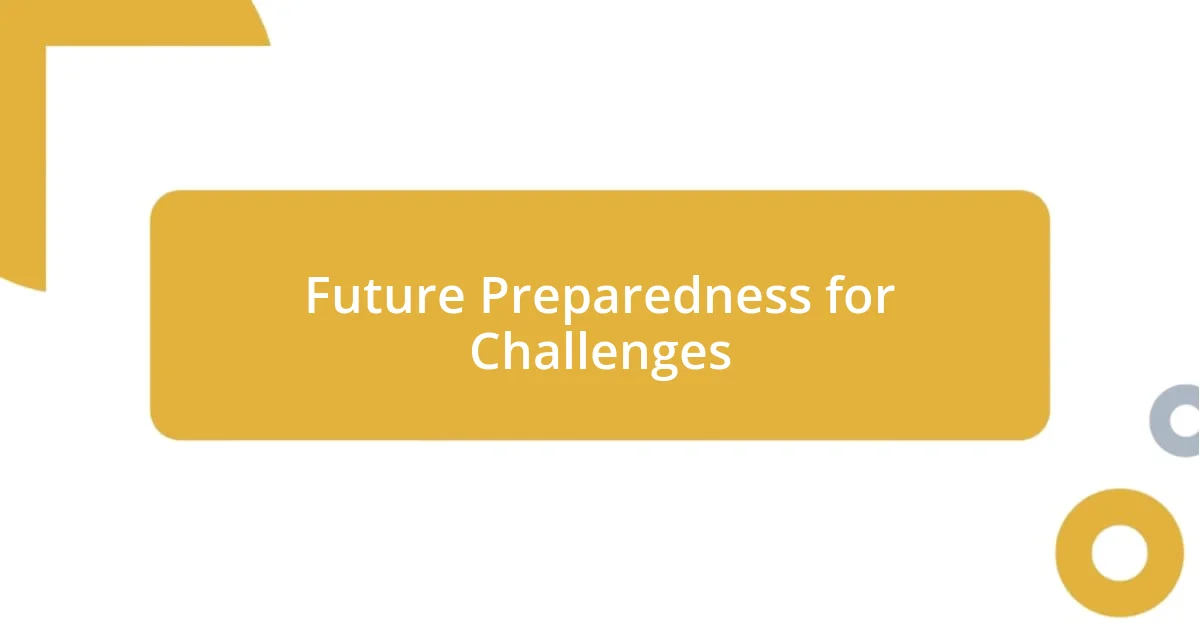
Future Preparedness for Challenges
When I think about preparing for future challenges, I realize the importance of proactive planning. A few years ago, I faced a sudden job loss that sent me spiraling. I had never anticipated that kind of upheaval, so I vowed to build a financial cushion for the future. Have you ever put strategies in place only to be thankful later? That experience taught me that having savings can offer a sense of security when life’s uncertainties hit.
Additionally, I’ve found that developing a growth mindset is crucial for resilience. There was a time when I purely focused on my current skills, limiting my perspective on what I could achieve. It wasn’t until I embraced the idea that I could learn and grow, regardless of setbacks, that I truly flourished. It’s fascinating how shifting your mindset can open doors to new possibilities, isn’t it? Embracing lifelong learning has not only expanded my skills but has also prepared me to tackle unknown challenges with confidence.
Lastly, building a network of mentors and peers has been invaluable in my journey. Reflecting on my career, I remember how a mentor’s guidance shifted my approach to obstacles. Whenever I faced new hurdles, reaching out wasn’t just about seeking advice; it was about fostering connections that provided encouragement and wisdom. Have you considered how your network can help you during tough times? I believe that surrounding ourselves with positive influences and experienced voices can significantly enhance our preparedness for whatever lies ahead.
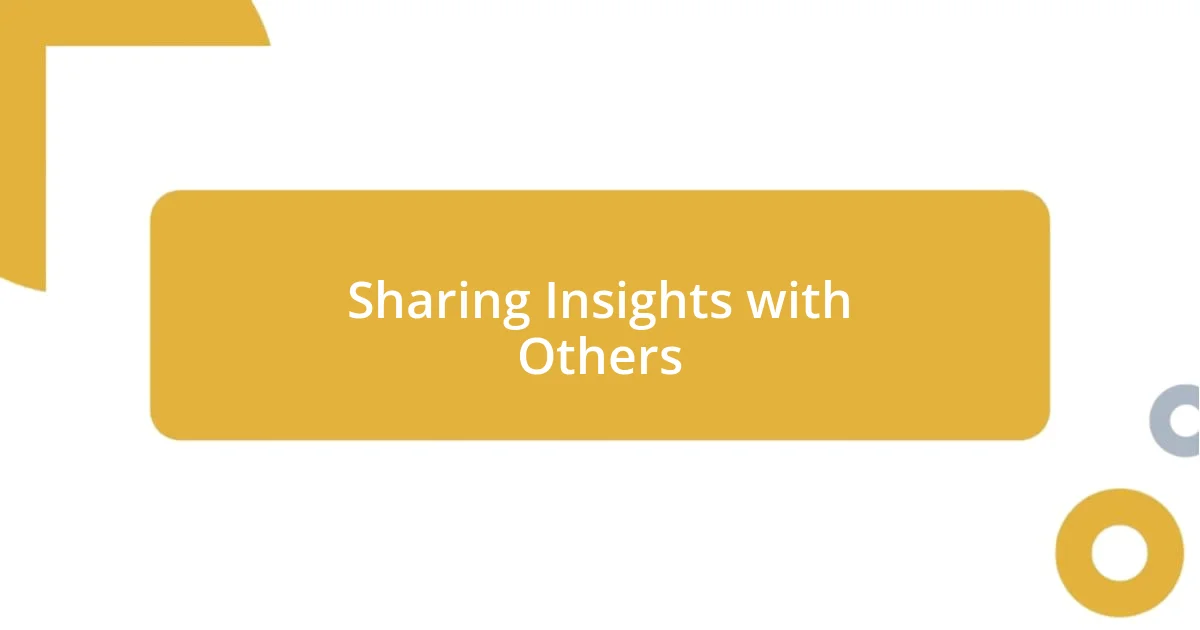
Sharing Insights with Others
Sharing insights with others has been a transformative experience for me. I vividly remember a time when I attended a workshop where individuals shared their unique struggles. Listening to their stories, I found a sense of connection that I hadn’t anticipated. It got me thinking: Have you ever felt that sharing your own story could help someone else? It was in those honest exchanges that I realized vulnerability is a bridge that brings us closer together.
Participating in discussions, whether online or face-to-face, has enriched my understanding of diverse perspectives. I once joined a book club that delved into themes of resilience, and the conversations that followed changed my outlook. Each person’s interpretation was a new lens through which I could see my own challenges. Isn’t it fascinating how a simple discussion can spark new ideas and insights? These collective reflections have widened my emotional toolkit, equipping me with different strategies to tackle life’s hurdles.
Moreover, I’ve learned that sharing insights isn’t just about giving advice; it’s also about active listening. I can recall a moment when a friend shared a distressing experience, and instead of jumping in with my thoughts, I simply listened. The relief she expressed afterward made me see the value of being present for others. Have you ever realized that sometimes, your role is just to be a sounding board? That connection, built through empathy and understanding, has deepened my relationships and reinforced the idea that every voice has something valuable to contribute.







